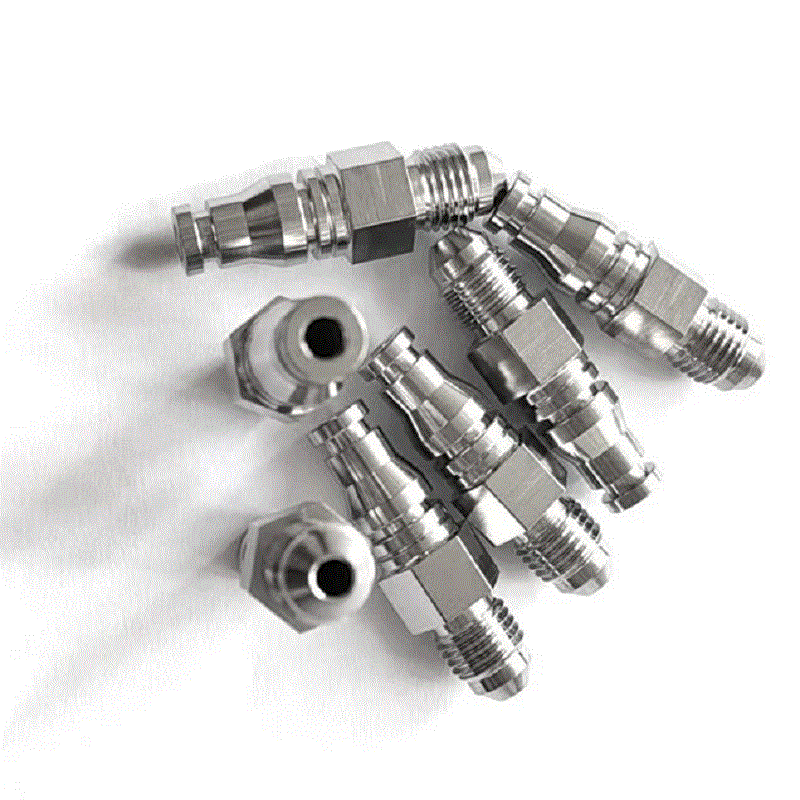Custom Titanium Parts
Custom Titanium Parts
Blog Article
Custom Titanium Parts refers to parts made of titanium and titanium alloys according to customer-specific needs through CNC processing, 3D printing, casting, forging and other processes. Unlike standardized parts, customized titanium parts can be personalized according to drawings, functions, dimensions, tolerances, surface treatment and other technical requirements, and are widely used in industrial and high-end application fields with strict requirements for strength, corrosion resistance, light weight and high performance.

Applications:
Aerospace field: used to manufacture aircraft structural parts, engine parts, rocket components, satellite shells, etc., because titanium is light, high-strength and high-temperature resistant.
Medical devices and implants: manufacture human bone nails, joint replacements, dental implants, etc., because of its excellent biocompatibility.
Automotive industry: used in racing cars and high-end vehicle exhaust systems, suspension systems and other parts, pursuing weight reduction and corrosion resistance.
Marine engineering: manufacture submarine shells, propellers, connecting parts, etc., because they are not easy to corrode in seawater.
Chemical equipment: used as parts of key equipment such as reactors and heat exchangers, which can resist strong acid and alkali corrosion.
High-end consumer goods: such as high-end eyeglass frames, watch parts, pen cases, custom tools, etc., because of their high-end texture and durability.
Energy field: In nuclear power equipment and fuel cell devices, titanium parts have high temperature stability and chemical inertness.
Material:
Pure titanium (Grade 1 ~ Grade 4): soft and ductile, suitable for high corrosion resistance requirements.
Titanium alloys (such as Ti-6Al-4V, Grade 5): widely used in aviation, Medical, and automotive fields, with high strength, good temperature resistance, and good processing performance.
Other titanium alloys (such as Ti-3Al-2.5V, Ti-6Al-7Nb, Ti-15Mo): adjust alloy elements according to specific uses to improve creep resistance, ductility or biocompatibility.
Features:
Lightweight and high strength: The specific gravity of titanium is about 60% of steel, but the strength is equivalent or even higher, which is suitable for structural weight reduction occasions.
Extremely strong corrosion resistance: excellent performance in corrosive environments such as seawater, chlorides, acids and alkalis, suitable for extreme working conditions.
Good biocompatibility: It is non-toxic to the human body and does not cause rejection reactions. It is one of the preferred materials for medical implants.
Good high temperature resistance: Some titanium alloys can maintain strength above 600℃ and are suitable for high temperature environments.
High processing difficulty: Titanium has high hardness, poor thermal conductivity, and is easy to rebound. Professional equipment and tools are required for precision processing.
High-cost materials: Titanium prices are relatively high, and the difficulty of processing also increases costs. It is usually used in high value-added Industries.
Medium wear resistance: Pure titanium is relatively soft and needs to be enhanced through surface treatment.
Advantages:
Meet personalized needs: According to customer drawings or samples, any structure, size, and precision requirements can be achieved to adapt to complex projects.
Improve product performance: The strength, lightness, and corrosion resistance of titanium materials help the entire system reduce weight, extend life, and improve overall performance.
Suitable for harsh environments: It is still stable and reliable in high temperature, high corrosion, and strong pressure environments, and has strong adaptability.
Long service life: The combination of corrosion resistance and high strength greatly extends the maintenance cycle and replacement cycle of equipment or components.
Enhance product grade: Titanium is widely used in high-end consumer goods to enhance the product's texture and market value.
Can be used in combination with other materials: such as titanium combined with carbon fiber, ceramics and other materials to enhance composite functions.
Strong environmental protection: Titanium is recyclable and non-toxic, suitable for industries with high requirements for environmental and human safety.
FAQ:
Is the delivery cycle of titanium parts longer than that of ordinary parts?
Yes. The customization of titanium parts usually involves complex processing technology and high precision requirements. In addition, the processing speed of titanium is relatively slow, so the general delivery time is longer than that of ordinary steel parts. Usually, the small batch customization cycle is 1 to 3 weeks, and large batches or parts with complex structures require more than 4 weeks, depending on the specific drawings.
Is titanium suitable for welding? Can customized structural parts be integrated with welding?
Titanium can be welded, but the welding environment must be oxygen-free or protected by inert gas (such as argon arc welding), otherwise it will oxidize and embrittle. Most customized titanium structural parts such as pipe fittings, shells, etc. require professional welding processes (such as vacuum welding, laser welding) to ensure the strength and corrosion resistance of the joints.
Can custom titanium parts be surface treated, such as anodizing or polishing?
Yes. Common surface treatments for titanium parts include anodizing (which can present different colors), sandblasting, electrolytic polishing, physical vapor deposition (PVD), etc. Different processes can improve appearance, wear resistance, and corrosion resistance. Anodizing can also play an identification or decorative role and is widely used in high-end products.
Can titanium parts replace stainless steel or aluminum alloys?
It can be replaced, but the cost-effectiveness needs to be evaluated. Titanium is stronger than aluminum and has better corrosion resistance than stainless steel. It is suitable for high-demand occasions, but it is expensive and difficult to process. If it is only used for daily structural support or non-extreme conditions, stainless steel or aluminum alloy is more economical; but in applications that require light weight, high strength, corrosion resistance, biocompatibility and other properties, titanium is more preferred.